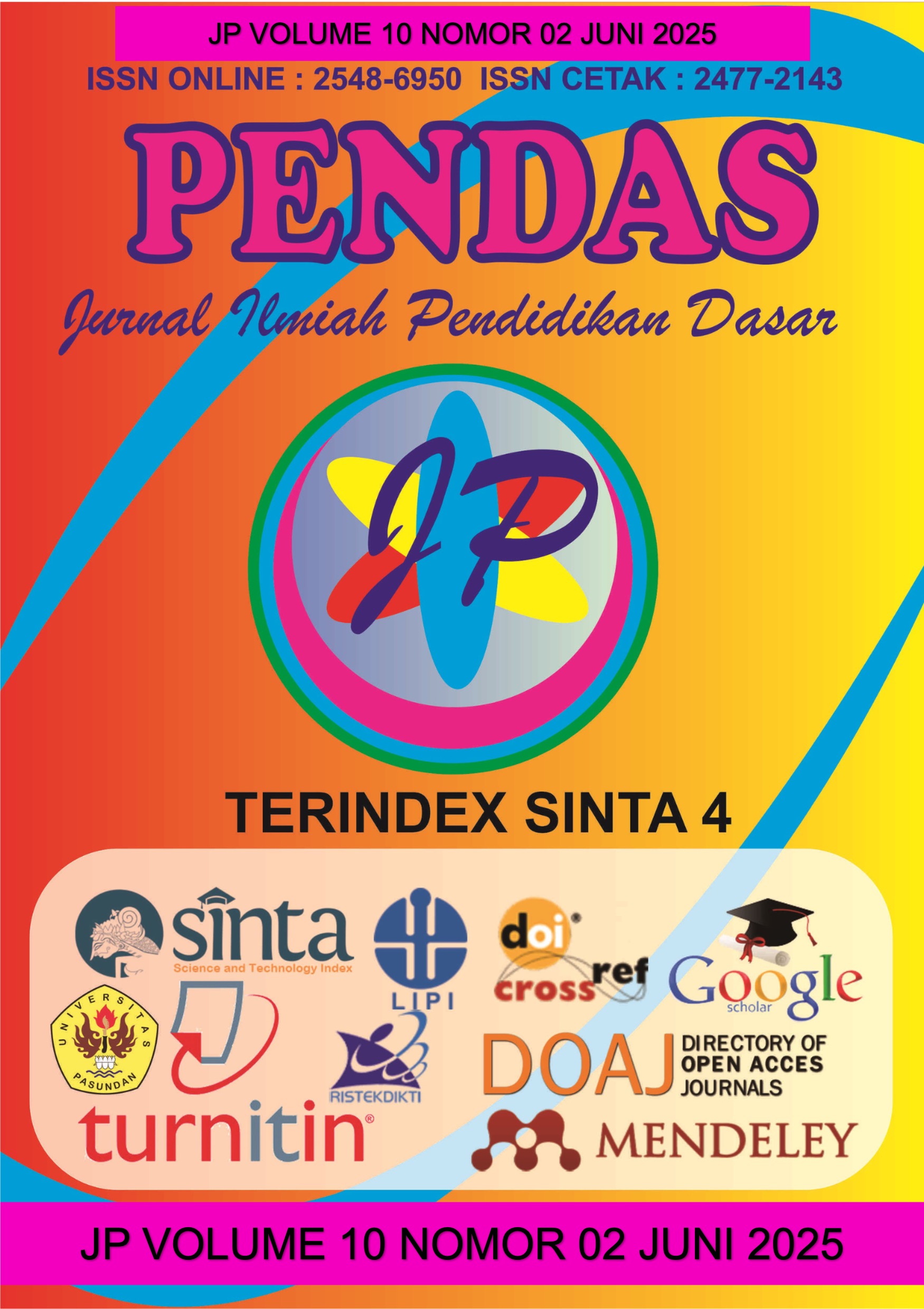PENGEMBANGAN MODEL PEMBELAJARAN PENDIDIKAN AGAMA ISLAM YANG MENYENANGKAN DAN EFEKTIF PADA SISWA SMP NEGERI 8 BUTON
DOI:
https://doi.org/10.23969/jp.v10i02.27100Keywords:
learning model, Islamic Religious Education, enjoyment, effectiveness, Classroom Action Research, learning outcomes.Abstract
ABSTRACT
This study was conducted with the aim of designing a learning approach for Islamic Religious Education (PAI) that is not only academically effective but also capable of creating an enjoyable learning atmosphere for students at SMP Negeri 8 Buton. The innovation in this learning model was intended to encourage active student engagement, foster positive perceptions toward PAI, and optimize academic achievement. The method employed was Classroom Action Research (CAR), which was implemented in two cycles. Each cycle consisted of the stages of planning, action implementation, observation, and reflection. The study involved 30 eighth-grade students as the primary subjects. The findings revealed clear and significant impacts across various indicators. In the first cycle, student participation increased sharply from 43.3% in the pre-cycle to 76.7%. Students’ perceptions of the learning process also improved positively, with 93.3% of students reporting that the learning experience became more engaging in the second cycle, up from 76.7% in the first. Academic performance followed a similar upward trend. The average student score rose from 68.2 in the pre-cycle to 82.4 by the end of the second cycle. Furthermore, over 86% of students succeeded in surpassing the Minimum Mastery Criteria (KKM), indicating that the developed learning approach effectively enhanced students’ understanding of PAI material.
Downloads
References
Arikunto, S., & Jabar, C. S. A. (2018). Evaluasi program pendidikan: Pedoman teoritis praktis bagi mahasiswa dan praktisi pendidikan. Bumi Aksara.
Arbi, Z. (2020). Pengaruh model pembelajaran berbasis masalah terhadap motivasi belajar PAI peserta didik di SMA Tadika Pertiwi. Institutional Repository UIN Syarif Hidayatullah Jakarta.
Fauzi, A., & Nurhanah, W. (2023). Pengaruh pembelajaran contextual teaching and learning (CTL) dan motivasi belajar terhadap hasil belajar PAI siswa kelas VIII. Jurnal Pendidikan Karakter JAWARA, 12(1), 45–56.
Halawa, N. N. (2023). Upaya meningkatkan motivasi belajar siswa melalui penerapan model pembelajaran problem based learning pada mata pelajaran matematika kelas VII. Jurnal Pendidikan Tambusai, 7(2), 150–162.
Hasnawati, H. (2022). Model pembelajaran PAI di era digital. Jurnal Pendidikan Islam, 9(2), 123–134.
Istiani, I. (2019). Pengaruh model pembelajaran joyfull learning terhadap hasil belajar siswa. PESAGI (Jurnal Pendidikan dan Penelitian Sejarah).
Mashuri, M. (2022). Peningkatan hasil belajar PAI siswa kelas VIII melalui implementasi model discovery learning. Jurnal Mudarrisuna: Media Kajian Pendidikan Agama Islam, 18(1), 67–78.
Minaryati, M. (2023). Pengaruh model pembelajaran PBL terhadap motivasi belajar PAI peserta didik kelas V di SDIT Darul Fikri. Jurnal Ilmu Pendidikan, 4(1), 12–25.
Muslimin, M. (2022). Penerapan pendekatan kontekstual dalam pembelajaran PAI. Mujaddid: Jurnal Pemikiran Keislaman, 18(1), 67–78.
Nasir, A. (2023). Efektivitas model PAIKEMI terhadap prestasi belajar siswa SMP. Jurnal Istiqra, 11(1), 89–101.
Setiawati, A. (2023). Pengaruh model pembelajaran project based learning terhadap hasil belajar PAI siswa SMP Muhammadiyah Serbalawan. Jurnal Pendidikan Islam, 12(2), 50–60.
Syarifuddin, A. (2023). Pemanfaatan teknologi dalam pembelajaran PAI di SMP. An-Najah: Jurnal Pendidikan Islam, 7(2), 150–162.
Susanti, Y. (2024). Penerapan metode pembelajaran aktif dalam meningkatkan hasil belajar PAI. Jurnal Pendidikan Islam dan Ilmu Sosial, 7(1), 34–46.
Wiriaatmadja, R. (2014). Metode penelitian tindakan kelas. Remaja Rosdakarya.
Yetmi, R., & Siti, A. (2024). Pengaruh pembelajaran kooperatif tipe make a match terhadap hasil belajar PAI di SMP Negeri 1 Gayo Lues. Jurnal Pendidikan Agama Islam, 9(3), 112–124.
Downloads
Published
Issue
Section
License
Copyright (c) 2025 Pendas : Jurnal Ilmiah Pendidikan Dasar

This work is licensed under a Creative Commons Attribution 4.0 International License.














































